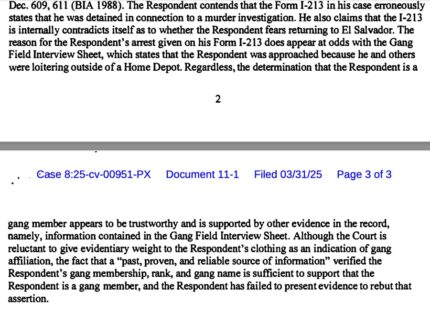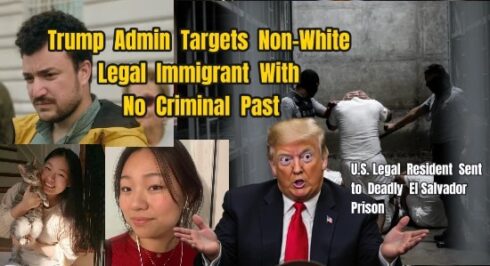In a stunning admission, the Trump administration acknowledged in court that it had wrongfully deported Kilmar Armando Abrego Garcia, a legal U.S. resident from Maryland, to one of El Salvador’s most notorious prisons. The administration cited an “administrative error” as the cause, raising serious concerns about the competence and fairness of the nation’s immigration enforcement system. Abrego Garcia’s case is just one among many similar incidents affecting lawful residents across the United States.
In what appears to be a troubling trend, the Trump administration has come under intense scrutiny for deporting legal residents with no criminal records, often under questionable circumstances. The most recent case involves Kilmar Armando Abrego Garcia, a Maryland father who was mistakenly deported to one of El Salvador’s most dangerous prisons. This incident, along with similar cases, has raised concerns of racial bias and deliberate targeting of non-white immigrants, prompting legal challenges and widespread outrage.
Trump administration’s Wrongful Deportation of Kilmar Abrego Garcia
In a shocking admission, the Trump administration recently acknowledged that Kilmar Armando Abrego Garcia, a legal U.S. resident from Maryland, was mistakenly deported to El Salvador. The deportation took place on March 15, 2025, despite Abrego Garcia having been granted protected status by an immigration judge in 2019. Following his removal, he was detained at the notorious Terrorism Confinement Center, known for its harsh and inhumane conditions.
Abrego Garcia was initially arrested by U.S. Immigration and Customs Enforcement (ICE) in mid-March, accused of being involved with the MS-13 gang—a claim his attorneys have vehemently denied, citing his clean criminal record and peaceful community presence. Despite acknowledging the mistake, U.S. officials claim they cannot mandate his return, as Salvadoran authorities currently detain him. This stance has sparked legal battles and debates on the administration’s aggressive deportation policies.

Deportation Policies Under Trump Administration
The Trump administration’s use of the 1798 Alien Enemies Act to expedite deportations has faced severe criticism from legal experts and human rights advocates. The policy, which is meant to target individuals suspected of gang affiliations or posing a national security threat, has been exploited to target non-white legal residents, often without substantiated evidence.
While ICE claims its actions are in the interest of public safety, critics argue that the policy disproportionately targets immigrants of color, regardless of their legal status or lack of criminal record. The swift nature of deportations under this act often leaves little room for due process, as evidenced in Abrego Garcia’s case.
Yunseo Chung: Student Activist Facing Deportation
Another alarming case is that of Yunseo Chung, a 21-year-old Columbia University student and legal permanent resident since the age of seven. Chung became entangled in deportation proceedings after participating in a peaceful sit-in at Barnard College, protesting student expulsions linked to political activism.
Following her arrest on charges of obstructing governmental administration (a fabricated accusation by the Trump administration), ICE initiated proceedings to revoke her green card, alleging that her actions posed “serious adverse foreign policy consequences.” This move was widely seen as an attempt to suppress dissent. Fortunately, a federal judge has temporarily blocked her deportation, allowing her to remain in the country as her case moves forward.
Trump administration Ongoing Pattern Also Targeted Palestinian Activist Targeted
Mahmoud Khalil, a Palestinian activist and legal U.S. resident, also faces deportation despite having no criminal record. Khalil, a prominent leader in pro-Palestinian demonstrations at Columbia University, has been accused of supporting Hamas—allegations his supporters firmly reject. Khalil’s case, much like Chung’s, underscores a pattern of targeting activists who voice dissent against U.S. foreign policies.
The Department of Homeland Security’s aggressive stance against Khalil has sparked community outrage, with Columbia University alumni protesting the school’s cooperation with federal authorities. Legal experts argue that the administration’s actions are not just legally questionable but also reflect an effort to stifle political opposition on college campuses.
Allegations of Racial Bias and Discrimination
Human rights organizations have expressed growing concern over what they describe as deliberate targeting of non-white legal immigrants under the Trump administration. Despite public declarations of prioritizing public safety, many of the individuals targeted have spotless criminal records and long-standing ties to their communities.
Civil liberties groups argue that the administration’s actions are rooted not in genuine security concerns but in racial discrimination. As legal battles continue, advocacy organizations are pushing for more rigorous oversight and accountability in deportation cases, especially those involving individuals with no criminal history.
Calls for Reform and Legal Action
The cases of Abrego Garcia, Chung, and Khalil have prompted renewed calls for immigration reform and heightened scrutiny of ICE’s practices. Advocacy groups have filed lawsuits challenging the legality of these deportations and demanding an end to racially biased enforcement.
Lawmakers and civil rights leaders are urging Congress to reassess the use of antiquated laws, such as the Alien Enemies Act, to target individuals solely based on perceived political affiliations or racial profiles. Many see these deportations as a direct assault on constitutional rights, especially those related to free speech and due process.
A Nation Divided Over Immigration
As these legal battles unfold, the nation remains starkly divided over immigration policies. While the Trump administration insists on prioritizing public safety, critics maintain that these deportations reflect a deeper pattern of targeting minority groups. Whether these individuals will receive justice remains uncertain, but their stories have already sparked a critical national conversation about civil liberties, racial discrimination, and the right to dissent.














